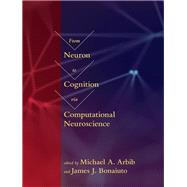This textbook presents a wide range of subjects in neuroscience from a computational perspective. It offers a comprehensive, integrated introduction to core topics, using computational tools to trace a path from neurons and circuits to behavior and cognition. Moreover, the chapters show how computational neuroscience—methods for modeling the causal interactions underlying neural systems—complements empirical research in advancing the understanding of brain and behavior.
The chapters—all by leaders in the field, and carefully integrated by the editors—cover such subjects as action and motor control; neuroplasticity, neuromodulation, and reinforcement learning; vision; and language—the core of human cognition.
The book can be used for advanced undergraduate or graduate level courses. It presents all necessary background in neuroscience beyond basic facts about neurons and synapses and general ideas about the structure and function of the human brain. Students should be familiar with differential equations and probability theory, and be able to pick up the basics of programming in MATLAB and/or Python. Slides, exercises, and other ancillary materials are freely available online, and many of the models described in the chapters are documented in the brain operation database, BODB (which is also described in a book chapter).
Contributors
Michael A. Arbib, Joseph Ayers, James Bednar, Andrej Bicanski, James J. Bonaiuto, Nicolas Brunel, Jean-Marie Cabelguen, Carmen Canavier, Angelo Cangelosi, Richard P. Cooper, Carlos R. Cortes, Nathaniel Daw, Paul Dean, Peter Ford Dominey, Pierre Enel, Jean-Marc Fellous, Stefano Fusi, Wulfram Gerstner, Frank Grasso, Jacqueline A. Griego, Ziad M. Hafed, Michael E. Hasselmo, Auke Ijspeert, Stephanie Jones, Daniel Kersten, Jeremie Knuesel, Owen Lewis, William W. Lytton, Tomaso Poggio, John Porrill, Tony J. Prescott, John Rinzel, Edmund Rolls, Jonathan Rubin, Nicolas Schweighofer, Mohamed A. Sherif, Malle A. Tagamets, Paul F. M. J. Verschure, Nathan Vierling-Claasen, Xiao-Jing Wang, Christopher Williams, Ransom Winder, Alan L. Yuille








